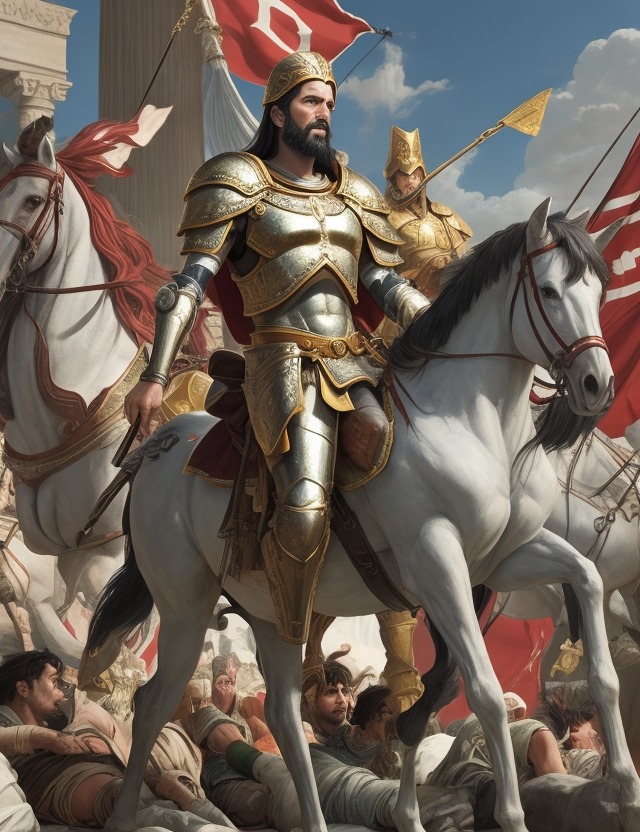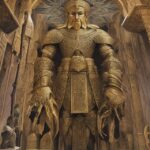Have you ever felt the captivating allure of an ancient classic tales that has stood the test of time? If you find yourself drawn to the power of myth and the enduring resonance of history, then prepare to embark on an extraordinary adventure within the pages of Homer’s masterpiece, ‘The Iliad.’ Through the meticulous exploration of gripping battle scenes, poignant tragedies, and timeless human emotions, this epic poem has enthralled readers for thousands of years. In this insightful article, we delve into the depths of this unparalleled work, uncovering its hidden layers and understanding the profound impact it continues to have on our collective consciousness.
Prepare to immerse yourself in the captivating world of ancient Greece, where gods guide mortal destinies and heroes strive for immortality in the midst of tragic circumstances. Through this comprehensively crafted examination of ‘The Iliad,’ we ensure that your insatiable hunger for understanding remains steadfastly satisfied. So, come forth, fellow adventurer, as we embark on an unforgettable expedition to unlock the secrets, significance, and sheer brilliance of one of humanity’s greatest literary achievements.
Iliad of Homer Summary
Summary Iliad. Once upon a time, there was a great city called Troy, ruled by a wise king named Priam. Troy was a magnificent place, with tall walls that surrounded the city and a mighty army that protected its people. But little did they know that a big, unfortunate war was about to begin.
The story of the Iliad starts with a quarrel amongst the gods on Mount Olympus, the place where they lived. Zeus, the most powerful of all the gods, had a plan to teach the humans a lesson. He wanted to remind them of their mortality and the importance of respecting the gods. So, he decided to cause a brutal war between two great powers – the Trojans and the Achaeans.
On the side of the Achaeans was King Agamemnon, a brave leader who commanded a vast army. He had many courageous warriors by his side, including the mighty Achilles. Achilles was the greatest warrior of the Achaeans, feared and respected by all. He was strong, fast, and his skill with a spear was unmatched. However, Achilles was a bit prideful and had a short temper.
On the Trojan side was Prince Hector, a noble and valiant warrior. Hector was the eldest son of King Priam and his greatest hope for the future. He was known for his bravery and his love for his city and its people. Hector had a loving wife named Andromache and a young son, whom he adored.
When Agamemnon decided to take a beautiful woman named Helen from Troy, the goddesses Hera and Athena helped bring the Achaeans to Troy. Helen, you see, was already married to King Menelaus, Agamemnon’s brother. This act angered the Trojans and sparked the start of the war.
For nine long years, the Achaeans and the Trojans clashed in battle. Heroes fought against heroes, and the gods involved themselves in the fight. Zeus, who had ignited the war, watched as both sides suffered great losses. He realized that the war had gone on for far too long and wanted it to come to an end.
Taking pity on the humans, Zeus sent a dream to Agamemnon, urging him to lead an attack against the Trojans. Excited by the dream, Agamemnon rallied his troops and prepared for war. However, this greatly upset Achilles, who had quarreled with Agamemnon previously over a captured maiden named Briseis.
Infuriated, Achilles decided to withdraw from the battle. Without the mighty Achilles by their side, the Achaeans faced a significant setback. The Trojans, led by Hector, took advantage of their absence and launched a fierce assault on the Achaeans. They pushed their way to the Achaean ships, burning and destroying them.
Amidst the chaos, Achilles’ dear friend Patroclus decided to wear Achilles’ armor and lead the Myrmidons, his troops, into battle. Patroclus fought with bravery but was eventually killed by Hector in a moment of desperation. Devastated by the loss of his friend, Achilles vowed revenge and rejoined the battle, seeking to avenge Patroclus’ death.
Achilles’ return to battle turned the tides once again. His fury was unmatched, and he fought with the strength of a god. He chased Hector, determined to avenge his fallen comrade. Their battle was intense, but ultimately Achilles overpowered Hector and killed him in front of the walls of Troy.
After Hector’s death, King Priam and Queen Hecuba mourned their beloved son’s loss. They begged Achilles to return Hector’s body to them. Touched by their grief, Achilles agreed, allowing them to hold a proper funeral for Hector.
The story ends with King Priam visiting Achilles in his tent to plead for his son’s remains. Achilles, moved by the old king’s humility and love for his son, granted his request. The two enemies shared a moment of understanding and respect. Thus, the war between the Achaeans and the Trojans came to a temporary halt as they mourned Hector’s death.
The Iliad is a tale of heroes, gods, love, and loss. It teaches us about the consequences of pride and the importance of compassion and forgiveness. It reminds us that even in times of war, there can be moments of peace and understanding. And above all, it shows us the power of storytelling to inspire and captivate generations with its timeless lessons.
Key Themes of The Iliad
The Iliad, written by the ancient Greek poet Homer, is an epic poem that tells the story of the Trojan War. It is an essential piece of literature that delves into various themes, providing insights into human nature and the consequences of war. Here, I will narrate the key themes of The Iliad, explain their significance, and mention three of them.
The first key theme explored in The Iliad is the destructive nature of pride and the consequences of hubris. The central character in the poem, Achilles, is a warrior of unmatched skill and bravery. However, his excessive pride and refusal to acknowledge any authority except his own lead to disastrous consequences. When his honor is slighted by Agamemnon, the leader of the Greek forces, Achilles withdraws from battle, causing significant losses for the Greeks. Throughout the poem, the consequences of Achilles’ pride are highlighted, as his absence leaves his comrades vulnerable. This theme serves as a cautionary tale, showing the dangers of unchecked ego and the importance of humility.
The second key theme in The Iliad is the tragedy of war and its gruesome realities. Homer vividly depicts the brutality and horrors of war, emphasizing the devastating impact on soldiers and their families. The poem presents a realistic portrayal of the violence and chaos that accompany conflict, highlighting the loss of life, the suffering of the wounded, and the grief of those left behind. The Iliad forces readers to confront the moral complexities of war, raising questions about the justification for such violence and the human costs involved.
The third key theme explored in The Iliad is the concept of fate and the role of the gods in human affairs. Throughout the epic, the gods intervene in the conflict between the Greeks and the Trojans, shaping the outcomes and determining the fates of individuals. The poem portrays a universe where humans are subject to the whims of divine beings, and their actions are influenced by both the gods’ favor and their wrath. This theme explores the concept of destiny and the idea that individuals are bound by predetermined outcomes, underscoring the idea that even the mightiest heroes are subject to forces beyond their control.
In summary, The Iliad delves into various themes, including the destructive nature of pride, the tragedy of war, and the concept of fate. Homer’s epic poem serves as a timeless exploration of human nature, providing both historical and moral insights that resonate even in modern times.
Main Characters List of Iliad
- Achilles: The mighty Greek warrior, Achilles is a force to be reckoned with on the battlefield. With golden locks flowing down his broad shoulders and a muscular physique that strikes fear into the hearts of his enemies, Achilles is the epitome of a Greek hero. However, his brashness and hot temper often lead him into trouble, causing friction amongst his fellow soldiers.
- Hector: The noble Trojan prince, Hector is a stark contrast to Achilles. With a composed demeanor and a strong sense of duty, he is a beloved leader among his people. Standing tall, with a regal bearing and dark, curly hair framing his face, Hector is a formidable opponent on the battlefield. Despite his valiant efforts, he is haunted by the knowledge of the impending fall of Troy.
- Helen: The woman whose face launched a thousand ships, Helen is the beautiful queen of Sparta. Renowned for her breathtaking beauty, her long, cascading blonde locks seem to shimmer in the sunlight. However, her presence in Troy has caused a decade-long war, as she is torn between her love for her Trojan husband, Paris, and her loyalty to her Spartan husband, Menelaus. Iliad Helen of Troy.
- Agamemnon: The commanding leader of the Greeks, Agamemnon exudes authority and power. With a prominent, regal beard and piercing blue eyes that seem to see into one’s soul, Agamemnon demands obedience from his soldiers. However, his egotistical nature often leads to clashes with other Greek leaders, especially Achilles, causing divisions within the ranks.
- Patroclus: Achilles’ loyal best friend and companion, Patroclus is a constant source of support and counsel. With a warm smile and curly brown hair that always seems slightly tousled, he is adored by both the Greek soldiers and the Trojan people. Patroclus possesses a gentle nature, but when needed, he can wield a sword as skillfully as any warrior.
- Priam: The aged king of Troy, Priam embodies wisdom and experienced leadership. With a long, flowing white beard and kind, wise eyes, he is respected by his fellow Trojans. Priam’s role in the story centers around his attempts to negotiate peace and protect his city from the relentless Greek siege, even facing the grief of losing his beloved son, Hector.
- Odysseus: The cunning Greek hero, Odysseus is known for his strategic mind and quick thinking. With a trimmed beard and wise, calculating eyes, he is always one step ahead of his opponents. Odysseus serves as a key figure in the Greek command; his resourcefulness often proves essential to their success.
- Paris: The Trojan prince who sparked the war, Paris captivates with his boyish charm and flowing, curly locks. While not the most respected warrior, his handsome appearance and skill with a bow make him an asset to the Trojan army. However, his decision to steal Helen from Menelaus ultimately results in the destruction of his city.
- Andromache: Hector’s loyal and loving wife, Andromache is the epitome of grace and strength. With deep, caring eyes, and auburn locks cascading down her back, she supports and encourages Hector on and off the battlefield. Andromache’s character adds an element of tenderness amidst the chaos of war, as she deals with the fear and sorrow of potentially losing her husband.
- Zeus: The king of the gods and the ultimate puppeteer in the war between the Greeks and Trojans, Zeus is a figure of immense power. With a flowing white beard, thunderous voice, and eyes that sparkle with mischief, he presides over the mortal realm from Mount Olympus. Zeus’ manipulation of events constantly keeps the characters on their toes, as they are mere pawns in his divine game.
The Iliad: Symbols
1. Achilles’ Armor: Achilles’ armor is a powerful symbol in The Iliad, representing his heroic status and his role as a warrior. The armor is described as a magnificent and intricate creation, crafted by the god Hephaestus, with golden decorations and scenes of mythological battles. It symbolizes Achilles’ strength, bravery, and divine connection, as he is considered nearly invincible while wearing it. However, when Achilles loses his armor to Hector after the death of Patroclus, it represents his vulnerability and loss of his heroic identity. The armor becomes a token of honor and a motive for revenge, driving Achilles to re-enter the battle and seek vengeance against Hector.
2. The Scaean Gates: The Scaean Gates are a symbolic location in The Iliad, serving as a boundary between the city of Troy and the outside world. The gates act as a threshold that separates the safety and civilization of Troy from the chaos and violence of the battlefield. They represent a physical and metaphorical barrier between opposing forces, symbolizing the divide between war and peace. The Trojans try to defend the gates throughout the epic, as their fall would mean the imminent destruction of Troy. The Scaean Gates become a symbol of resistance and defense against the invaders, highlighting the struggle and the stakes for both sides.
3. The Wooden Horse: The Wooden Horse is a powerful symbol in The Iliad, representing the ultimate deception and downfall of the city of Troy. After enduring a long and fruitless siege, the Greeks resort to a strategem by constructing a gigantic wooden horse, using it as a Trojan horse. The horse is a symbol of deceit and disguise, as it is built to look like a peace offering. However, it conceals the Greek soldiers inside, who later emerge and sack the city of Troy during the night. The Wooden Horse is a warning against trusting appearances and a symbol of the devastating consequences of underestimating one’s enemies. It serves as a reminder that victory in war may not always go to the strongest, but to the most cunning and deceptive.
Meaning of Iliad
The word Iliad comes from the Latin Ilias, which is derived from the Greek Ilias poiesis, meaning “poem of Ilion” or “poem of Troy”.
Setting of Iliad
The setting of the Iliad is an important aspect of the story, as it helps to establish the context in which the events of the poem take place. The Iliad is set in the late Bronze Age, around the 13th or 12th century BC. The story takes place on the western coast of Anatolia (modern-day Turkey), in the region of Troas. The main location of the action is the city of Troy, also known as Ilion, which is besieged by a coalition of Greek forces led by King Agamemnon. The Greeks have camped on the shore of the Aegean Sea, near the mouth of the river Scamander. The war lasts for ten years, and the poem covers only a few weeks of the final year. The poem also shifts to Mount Olympus, the home of the gods and goddesses, who intervene in the war and influence the fate of the heroes.
The setting of the Iliad reflects the themes of the poem, such as honor, glory, fate, free will, pride, grief, and love. The setting also creates a contrast between the human and the divine, the mortal and the immortal, the natural and the supernatural. The Iliad is one of the oldest and most influential works of Western literature, and is attributed to Homer, a legendary poet whose identity and existence are uncertain. The Iliad is composed of 24 books, each containing hundreds of lines of hexameter verse.
The Iliad: Culture Impact
The Iliad, an epic poem written by the legendary Greek poet Homer, is an extraordinary work of literature that has left an indelible mark on world culture. Its impact throughout history can be observed in various realms, from shaping the perception of ancient Greeks to inspiring subsequent literary masterpieces, and even amusing modern-day readers with its timeless humor.
Historically, The Iliad played a pivotal role in ancient Greek society, particularly during the Classical period. It served as a foundational text, carrying immense cultural significance and influencing many aspects of Greek civilization. The epic inspired a shared sense of identity among the Greeks, providing them with a shared set of values, heroic ideals, and customs. The characters within the poem, such as Achilles, Hector, and Odysseus, became archetypal figures embodying the virtues and flaws of humankind.
Moreover, The Iliad revolutionized the concept of war literature. Prior to its creation, war narratives often idealized conflict, portraying battles as glorious and triumphant. Homer, however, depicted the horrors and sufferings of war with unprecedented realism. The poem delves into the psychological impacts of warfare, exploring the devastating consequences on both individuals and societies. This portrayal of war’s human cost marked a significant departure from traditional narratives and greatly influenced subsequent works of literature.
Despite being an ancient text, The Iliad retains a sense of humor that appeals to people across time. Homer skillfully weaved moments of levity throughout the poem, creating amusing and relatable situations within the epic drama. From the comical interactions between gods and mortals to the bickering and bantering among the Greek warriors, these lighthearted moments serve as a reminder that even in the face of turmoil, humor can provide a temporary respite and foster resilience.
The book’s achievements are nothing short of extraordinary. Its intricate narrative structure, rich character development, and profound exploration of human nature have cemented its status as a masterpiece of world literature. The Iliad’s enduring popularity and influence can be witnessed in countless adaptations, from theater productions to contemporary retellings. Its themes and lessons continue to resonate with readers, as it explores universal concepts such as mortality, honor, and the complexities of human relationships.
In conclusion, The Iliad’s cultural impact has been profound and far-reaching. Its historical significance lies in its ability to shape the perception of ancient Greeks, serving as a touchstone of collective identity. The Iliad’s realistic depiction of war challenged traditional narratives, inspiring subsequent generations of writers to approach the subject with greater authenticity. Furthermore, its timeless humor provides both laughter and insight into the human condition. Ultimately, The Iliad stands as a testament to the power of literature to transcend time and impact the culture of multiple generations.
FAQs
1. Who is the author of The Iliad?
The author of The Iliad is the ancient Greek poet Homer.
2. What is the main plot of The Iliad?
The main plot of The Iliad revolves around the Trojan War, specifically the feud between the Greek hero Achilles and the Trojan prince Hector.
3. What is the significance of The Iliad in ancient Greek literature?
The Iliad is considered one of the greatest epic poems in ancient Greek literature. It serves as a foundation for Western literature and provides important insights into ancient Greek values, heroic ideals, and the consequences of war.
4. How long is The Iliad?
The Iliad consists of 24 books or chapters and has a total of approximately 15,693 lines of verse. The length may vary depending on the translation.
5. What are some key themes explored in The Iliad?
Some key themes explored in The Iliad include the nature of heroism, the wrath of Achilles, the role of the gods in human affairs, the costs of war, and the complexities of human mortality and fate.
6. Is it The Iliad or just Iliad?
the Iliad is the name of an ancient Greek epic poem attributed to Homer, which tells the story of the Trojan War. The word Iliad comes from the Greek Ilias poiesis, meaning “poem of Ilion” or “poem of Troy”. However, some translations might use the term Iliad to refer to the entire Trojan War story, not just the poem by Homer. In that case, the word Iliad is used as a synecdoche, a figure of speech in which a part is used to represent the whole.










